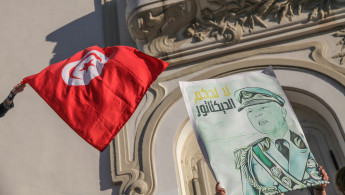Tunisia election: diaspora dream of returning amid Saied's ongoing repression
Across the Tunisian diaspora, many exiles are yearning to return home but are unable to because of President Kais Saied's authoritarian and repressive policies which have seen hundreds of dissidents and political opponents jailed.
"If I go back to Tunisia, I'll probably be arrested", says Kaouther Ferjani, the daughter of political prisoner Said Ferjani, currently living in the UK. She has been a vocal critic of Saied's rule, and like many in the diaspora, she doesn't trust that upcoming presidential elections will be fair or bring about change.
On 4 October, members of the Tunisian diaspora in the UK and elsewhere cast their votes for the next president, a contest with only three candidates: President Saied, his former ally Zouhair Magzhaoui, and Ayachi Zammel, who is serving a 12-year sentence for alleged electoral fraud.
But for Ferjani, none of them are worth her vote. "I refuse to legitimise this election... Saied will use those who show up against us."
It's a sentiment echoed by many in the diaspora who believe the electoral process is rigged, with the Saied-appointed Independent High Authority for Elections (ISIE) handpicking candidates and ignoring legally binding orders from courts to reinstate three other disqualified candidates.
Last week, the Tunisian parliament – elected on a turnout of only 11% – stripped the country's administrative court from its ability to rule in election appeals in an unprecedented last-minute decree.
Kaouther's father, Said Ferjani, was among over 40 political opponents arrested during a crackdown on political opponents in February 2023.
He was detained as part of an investigation into the digital content production company Instalingo, which provided services to Arabic-speaking media outlets critical of Saied, and was accused of inciting violence and slandering the president.
A former MP with the moderate Islamist Ennahda party, Ferjani spent years in exile during former President Zine El Abidine Ben Ali's authoritarian rule before returning after the 2011 revolution, which brought democratic government to Tunisia for a time.
However, he now finds himself imprisoned again, with 12 people in one cell, suffering health issues and awaiting trial.
"They've taken away even Tunisia's sunlight from us, all for daring to criticise Saied," laments Chaima Issa, the first female political prisoner under Saied, released in June on a suspended sentence.
However, Majdi Karbai, another diaspora and former MP, now based in Italy, believes voting is crucial despite everything. Karbai advocates for participating in the election, hoping this will reduce any margin for manipulation of results.
"It's respect for those who died to give us this chance," he says, referencing the people killed during Tunisia's 2011 revolution.
From Rome to Tokyo, several opponents of Saied have opted to vote, particularly for Ayachi Zammel, a candidate who started as a little-known outsider but has since become a folk hero in Tunisia after being sentenced to 12 years in prison for allegedly faking endorsements.
Saied's opponents are backing him as an act of defiance against what they call the incumbent president's "manipulation of justice".
On 5 October, Zammel's campaign announced that the diaspora had overwhelmingly backed him, inspired by his promise to overturn Saied's 2022 constitution, widely decried as "authoritarian" and dismantle the legal framework Saied has built since he assumed extraordinary powers in 2021. Official numbers have yet to be revealed.
While opposition remains divided on the best way forward—whether to boycott or vote—they agree on one thing: another five years under Saied would be unbearable. "People are already protesting," says Ferjani. "If things don't change, we'll see more protests and more people fleeing [the country]."
The tragic exodus has already begun. Last month, 12 people died and 10 are still missing after a boat headed for Europe capsised near Tunisia's Djerba, one of many recent shipwrecks. In 2022 alone, over 1,300 people died or went missing attempting similar crossings near Tunisia.




 Follow the Middle East's top stories in English at The New Arab on Google News
Follow the Middle East's top stories in English at The New Arab on Google News

![A group of Palestinians, foreign and Israeli activists gather to participated in an olive picking event on the land in the town of Battir, which is under threat of confiscation by Israel in Bethlehem, occupied West Bank on 8 November 2024. [Getty]](/sites/default/files/styles/image_330x185/public/2182930803.jpeg?h=199d8c1f&itok=__0LgGsa)
